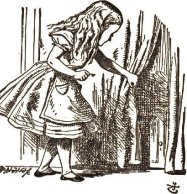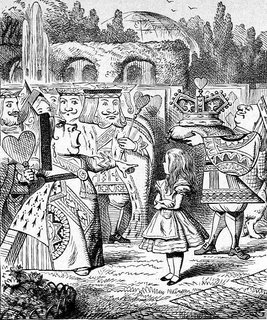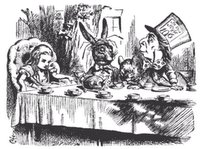Question Actions, Not Feelings
Many years after his death, folks began to speculate that Charles Lutwidge Dodgson, who wrote under the name Lewis Carroll, may have taken some erotic as well as aesthetic pleasure in his friendship and photographic fascination with little girls. There is no evidence that he ever behaved inappropriately around children, but he clearly enjoyed the company of children whilst having no family of his own (not unlike Beatrix Potter, J. M. Barrie, Hans Christian Anderson and Louisa May Alcott – obviously all raving perverts). Bored Freudians picked up on any reference to inner turmoil or conflict in his work and concluded that he must have been a paedophile – you didn’t think that inner turmoil and conflict were part of the human condition, did you? Dodgson, or Dodgy as I like to call him, also had epilepsy, impaired hearing and a stammer, and was thus overqualified as a fictitious villain.
 The whole thing is poetic; the guy was both delightful and disturbing in his writing which explored the nature of the innocent and the sinister, eccentricity and madness, wisdom and ineptitude and various other issues which we struggle with even more now than in Victorian times. Of course there must be something sinister about him! Instead of thinking about what darkness it might be within us which makes the reading sometimes uncomfortable, let’s put it all down to his own darkness. Nothing to do with us.
The whole thing is poetic; the guy was both delightful and disturbing in his writing which explored the nature of the innocent and the sinister, eccentricity and madness, wisdom and ineptitude and various other issues which we struggle with even more now than in Victorian times. Of course there must be something sinister about him! Instead of thinking about what darkness it might be within us which makes the reading sometimes uncomfortable, let’s put it all down to his own darkness. Nothing to do with us.Now I have a great affinity with Dodgson. He was a crip, an adopted son of Whitby, he provided the title of my book and he invented the portmanteau “chortle” - surely one of the greatest words in the English language. And when I was younger, until I actually read about his alleged suppressed paedophilia and realised it was as sturdy as the other accusation laid against his memory - that he was in fact Jack The Ripper - I even had sympathy with the chap in this respect.
Not that I had a thing about children or anything nearly so problematic, but I was tormented by feelings I didn't want to have. I mistrusted people I was supposed to respect, felt contempt for those I was supposed to admire and even disliked some of those I was supposed to love. But by far my greatest problem was the grand infatuations I would develop for totally and utterly inappropriate people.
Only that wasn’t quite the problem. Infatuations ought to be fun; you get all sorts of chemical rushes, the world seems like a better place and everything you look at is blue and kind of sparkly. The problem was that I tried to resist them.
We are taught that the only healthy attachments are mutually felt. If we love one another as friends, lovers, family members or whatever, I must love you just as much, but no more, than you love me. Any imbalance in this is harmful; one of us must be obsessive or the other emotionally stunted.
I question this. For one thing, even if this were true; if there was something unhealthy about anything other than total emotional reciprocity, how the hell would we ever know about it? But most importantly, how does even a dramatic disparity actually cause harm to anyone?
For me, it wasn’t about the frustration of wanting something that I could not have; I guess it could be for some people, but not me. It was more like wanting something that I did not deserve to have. In fact, it wasn’t even that; I never exactly wanted anything in particular, I just had these feelings which were much too strong, of an inappropriate nature and perhaps most essentially, totally and utterly unrequitable.
 So I felt lecherous and miserable and spent a great deal of time terrified that at some point, somehow, all this would slip out. I don’t know quite what I expected would happen then; that I might be dragged from my bed and lynched by torchlight, I don't know.
So I felt lecherous and miserable and spent a great deal of time terrified that at some point, somehow, all this would slip out. I don’t know quite what I expected would happen then; that I might be dragged from my bed and lynched by torchlight, I don't know.However, the essential point in all this is that it never did slip out. All that worry for nothing. Because even really big feelings do us little harm, so long as we don’t act on them. And indeed, exactly the same thing happens now with infatuations and I enjoy it, confident that the experience is mine alone. All this sin in thought stuff is nonsense; we only have so much conscious control over our thoughts, and very little control over our emotions.
And as everybody knows, the more one attempts to cast thoughts from one’s mind, the deeper they intrude (On a vaguely related subject in case anyone’s interested, here is a interesting if random article about religiosity and OCD). All we actually have a choice about is what we do and say about them – and here, usually, it is possible to keep them entirely under wraps if one so chooses.
 So back to Charles Lutwidge Dodgson (the Lutwidge is important; Lutwig is German for Lewis, Charles in Latin is Carolus, thus Carroll, see? Utter nonsense.). Of course I take the view that all Art should be looked upon completely separate from the Artist anyway, but even if we must lump the two together, we know of nothing that he did wrong. Maybe he was sexually attracted to children. Maybe Napolean thought he was an early incarnation of Elvis. Maybe Darwin's fascination with those Galápagos tortoises went further than it appears.
So back to Charles Lutwidge Dodgson (the Lutwidge is important; Lutwig is German for Lewis, Charles in Latin is Carolus, thus Carroll, see? Utter nonsense.). Of course I take the view that all Art should be looked upon completely separate from the Artist anyway, but even if we must lump the two together, we know of nothing that he did wrong. Maybe he was sexually attracted to children. Maybe Napolean thought he was an early incarnation of Elvis. Maybe Darwin's fascination with those Galápagos tortoises went further than it appears.None of this actually matters a jot. It is of no consequence to anybody.
I have a sense that nobody will know what the heck I am rambling on about today. However, I do think that this is one of the most important lessons of my life so far, so there.
2 comments:
You forgot Kenneth Grahame - he also was tarred with the paedophilia brush years after his death.
That's the thing with academia - you too can find a scandal to invent, thus becoming known & loved & invited on chat shows.
Jane Austen was an incestuous lesbian, didn't you know?
Hi,
I've been an occasional lurker for the past few weeks but just wanted to let you know that I really enjoyed this entry. I did know what you're talking about, and appreciated your insight.
Post a Comment